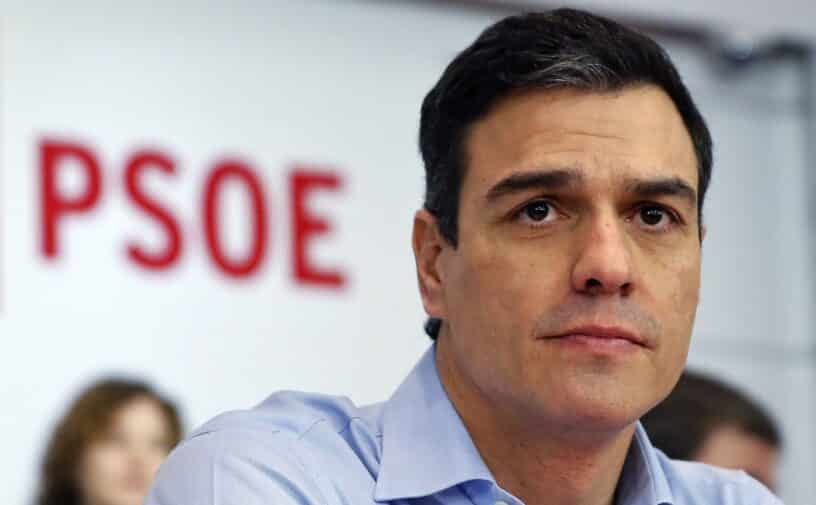

By Dave Stockton
PEDRO SANCHEZ, leader of the Spanish Socialist Workers’ Party (PSOE), is now in the Moncloa Palace as prime minister of Spain. Every progressive person in the Spanish state will be glad to see the back of the Popular Party’s autocratic leader Mariano Rajoy.
The critical moment came when the Basque Nationalist Party (PNV) revealed it would join Podemos, two Catalan pro-independence parties, and a second Basque party (BILDU) in backing a no confidence motion tabled by the PSOE in response to a major corruption scandal which engulfed the PP.
The liberal Ciudadanos (Citizens) party, which has recently surged ahead, overtaking its rivals in the polls, backed Rajoy, but leader Albert Rivera now senses a golden opportunity to replace the People’s Party as the main party of the right.
Podemos, which once declared its determination to completely supplant the PSOE and rejected the very idea of a coalition with it, called on Sánchez to form a coalition with Podemos ministers, an offer the PSOE leader immediately refused.
Podemos itself is now in the doldrums. The party’s guru, Pablo Iglesias, was recently forced hold to a plebiscite to reaffirm his leadership after vigorous internal opposition over his decision to buy a €600,000 house with swimming pool outside Madrid, which infuriated members and supporters of a party which made its name in part campaigning over Spain’s catastrophic housing crisis.
Immediately after the no-confidence vote, Sánchez stated, “We’re going to sign a new page in the history of democracy in our country”. Here the wary will pause a moment to ask, is this the same man who supported Rajoy’s refusal to countenance a referendum on Catalonia’s independence and the High Court’s judgments which drove the President of its Generalitat into exile and put several ministers into prison?
True, Sánchez has promised to enter into talks with the new Catalan government but he still rules out the possibility of a legal referendum on Catalonia’s status. At the same time, a new Catalan government headed by Joaquim ‘Quim’ Torra, a pro-independence stooge of the exiled President, Carles Puigdemont, has been sworn in, ending eight months of direct rule from Madrid.
Sánchez will probably repeal some of the most undemocratic aspects of Rajoy’s notorious “Gag Law” which imposed severe restrictions on demonstrations near parliament, the senate and regional parliaments, backed by fines of up to €600,000 for sit-ins in public places or the blocking of home evictions, if the “relevant authority” (a court, the police) has ordered the dispersal of the gathering.
But to write a genuinely new page in the tortuous history of democracy in Spain requires not the establishment parties’ obeisance to the post-Franco constitution, but its replacement through a democratically elected Constituent Assembly which abolishes the monarchy and recognises the right to self determination, up to and including secession from the Spanish state, for all its nationalities. Revolutionary socialists do not want to break up the Spanish state but that would be better than forced unity.
Sánchez has promised to address the “pressing social needs” of citizens in a country still plagued by high unemployment and the austerity imposed by successive governments, but he also immediately promised to retain the 2018 budget proposed by Rajoy, which the PSOE voted against only a week ago. His excuse is that only thus was he able to get the votes of the PNV, whose concern above all was to ensure the funds allocated to the Basque country, which it included. He says that it will “guarantee economic and fiscal responsibility” and emphasise that Spain will fulfill its “European duties”. But this will either tie the new government to the cuts and austerity measures of his predecessor or, if he changes some of them, like the proposed increase in pensions, he will still have to rob Peter to pay Paul.
There is an alternative to this, if he were prepared to introduce serious taxation of the fortunes of the wealthy and the big corporations. Of course, some will say, given his past record one might as well ask pigs to fly, but this is not the point. The trade unions and the youth, including the membership of the PSOE and Podemos, have demonstrated their willingness to fight during the years immediately after the Great Recession, and could and should now mobilise to demand Sánchez abandons austerity altogether. They should recall the massive support that Jeremy Corbyn got in Britain, both on the streets and at the ballot box, when he called for an end to austerity.
Some will say the EU would intervene to stop any government or leader that tried to break their ‘fiscal discipline’ just as they did with Syriza in Greece. But, unlike Alexis Tsipras, a Spanish government that dared to defy the EU should not waste its time sending academics to grovel in Brussels or Frankfurt. They should defy the Merkels and the Macrons and appeal directly to the workers of Europe to take action to support them. The record of Syriza’s capitulation shows that bold speeches from leaders are worth little if the workers and the youth are not organised and ready to take action independently if their leaders refuse to fight.
If Spain’s workers, oppressed nationalities, women and immigrant communities unite and open up a mass struggle for their vital needs in the coming months, then even this weak-kneed PSOE government can be used as a lever to win social and democratic rights, and open the road of struggle to a real workers’ government, based on the mass organisations of the working class; trade unions, socialist parties, and councils of action